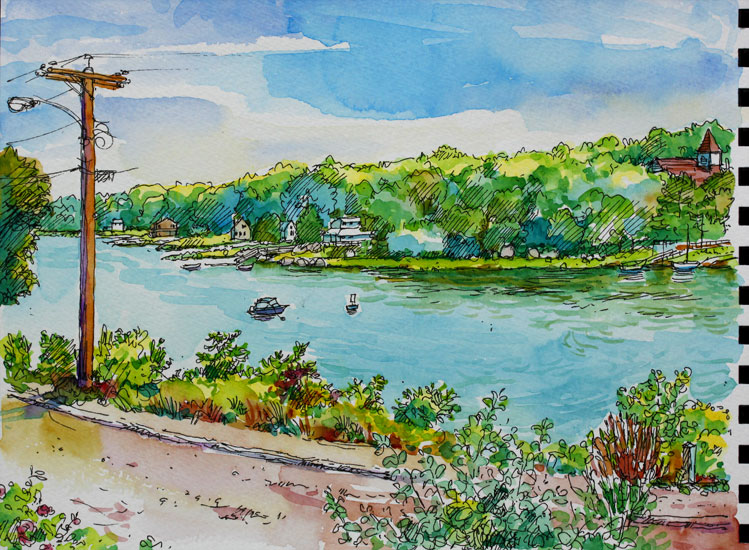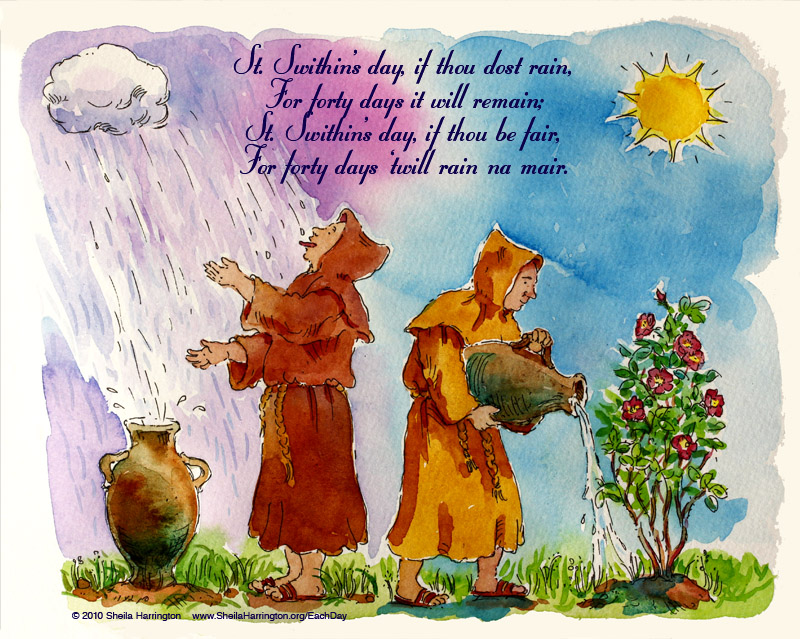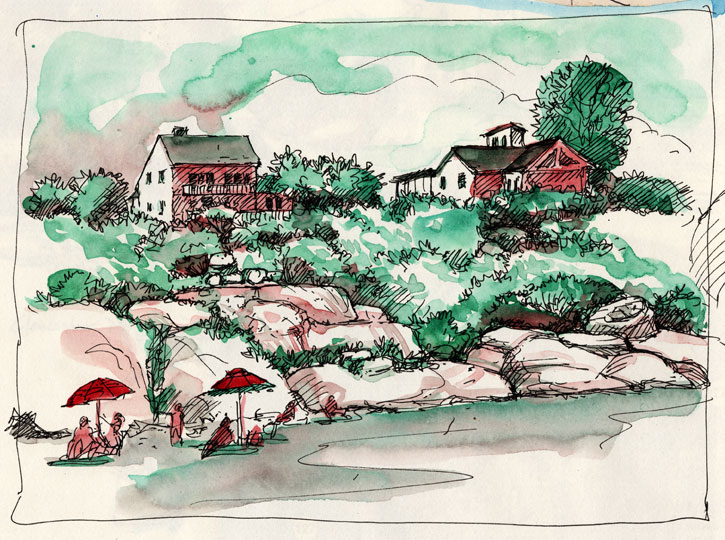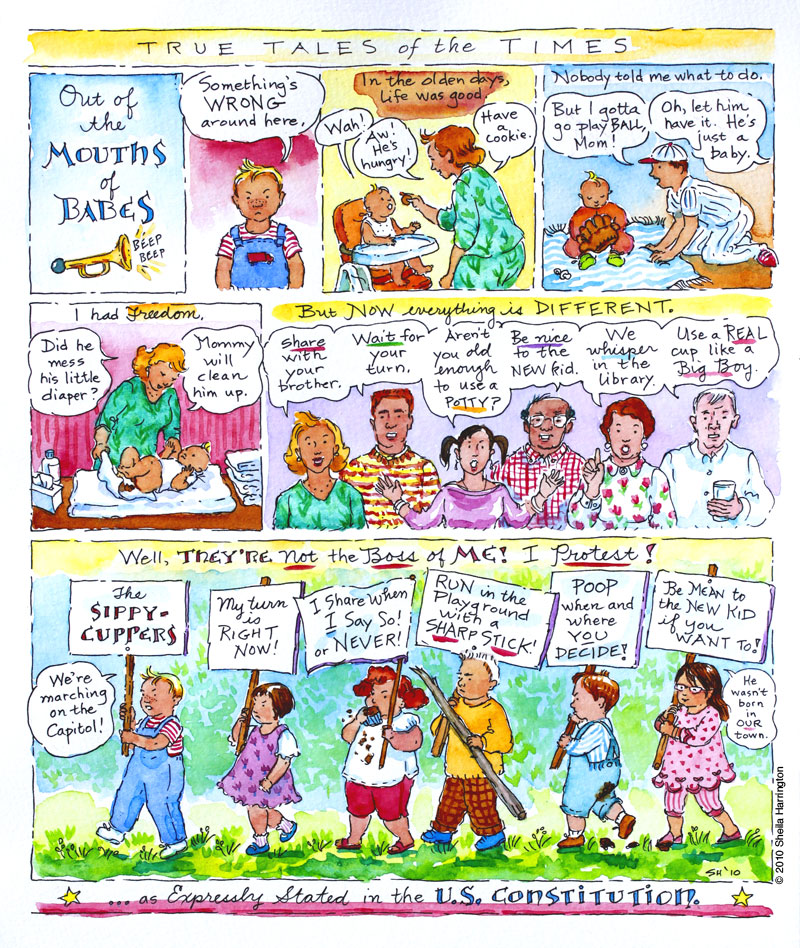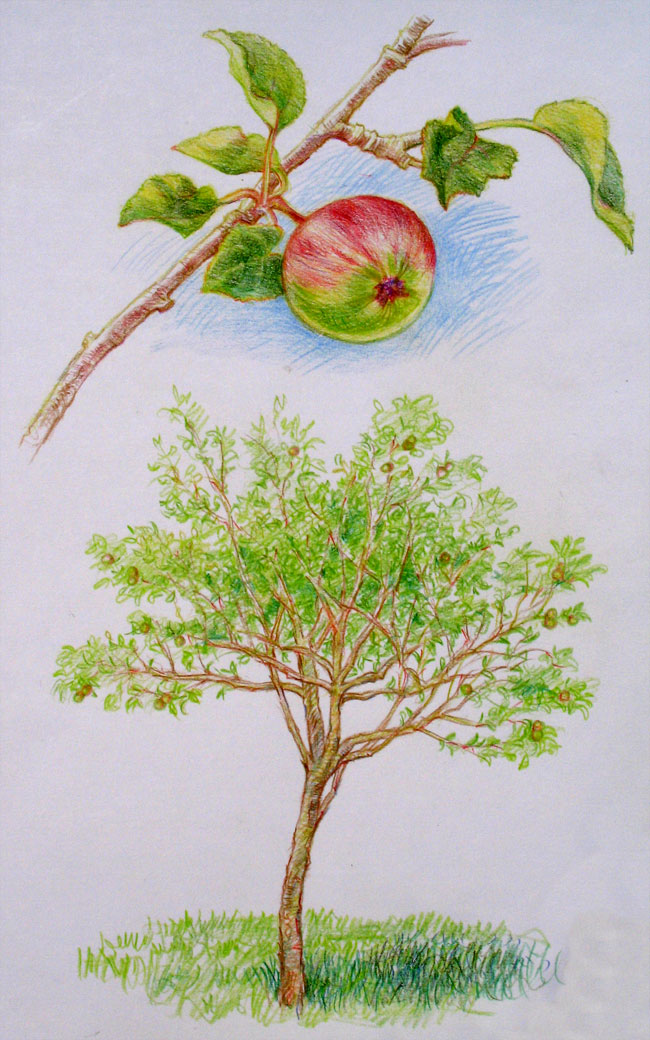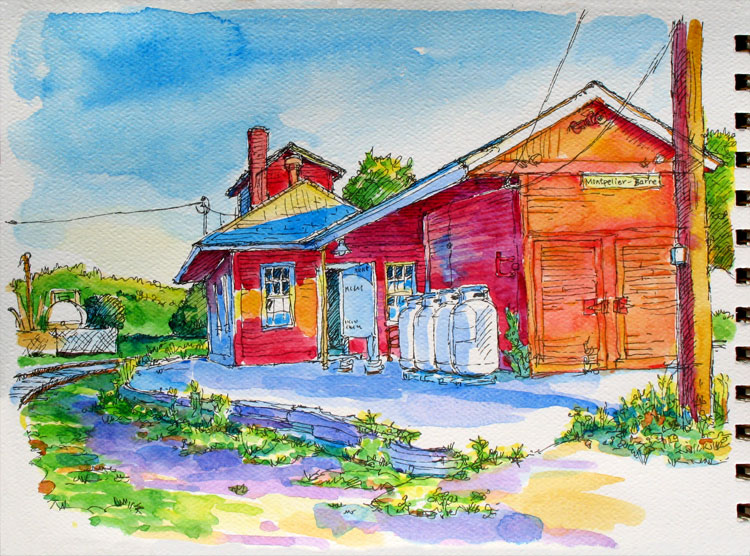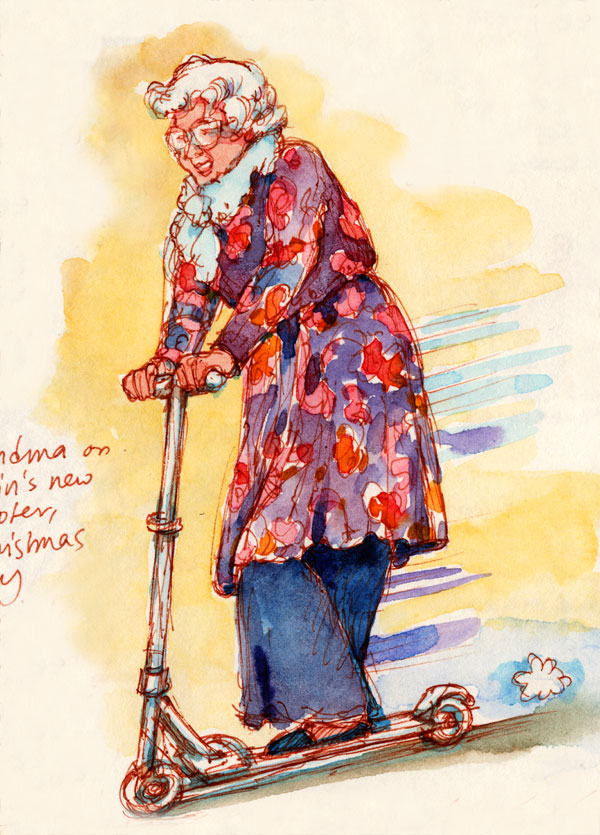I sketched this view across a spread. Tomorrow I post the right side.
Rain or Shine?
Look out the window. Doth it rain today, or doth it shine? Prepare yourself. Today is the feast day of St. Swithin, and for the next forty days you can plan your activities and wardrobe according to the old verse.
Swithin was born in the 9th century—the precise year is unknown—in Winchester, England, during the reign of King Egbert of Wessex, who ruled from 802 to 839. There are but a few reliable facts of his life, drawn from church records. Nevertheless, there must have been something about the fellow, for, both during his life and afterward, he inspired numerous stories and customs that have endured for the last twelve centuries.
Swithin was ordained as a monk and gained such a favorable reputation that he was selected as a tutor to Egbert’s son Aethelwulf. When Aethelwulf himself became king, he appointed his former tutor as bishop of Winchester, where for the next ten years Swithin built numerous churches as well as the town’s first stone bridge. Nevertheless he apparently remained a modest, unassuming fellow, charitable and sensible, preferring to go about on foot, avoiding ostentation. He also managed to convince Aethelwulf to donate a tenth of his own lands to pay for some of the church-building. Swithin’s dying request was to be buried not indoors within an elaborate shrine, as was customary with prominent folk, but outside in a simple churchyard grave, where “the rain may fall upon me, and the footsteps of passers-by.” When he died in 862, his request was granted…for a while.
But a hundred years later, when the bishops of Canterbury and Winchester were renovating the church and undertaking reforms, they cast about for relics of a saintly candidate to inspire their parishioners. Swithin had the fortune, or misfortune, to be associated with numerous miracles both before and after his death, among them the healing of ailments of the eyes and the spine, and the kindly repair of an elderly woman’s broken eggs so that they were good as new, a miracle that would certainly come in handy in any household. What luck to find a local guy that no one had yet claimed! The two bishops decided to elevate unpresumptuous St. Swithin to more prominent status. What better way than to remove his body from its humble grassy setting and place it in a more visible shrine within the newly renovated church?
Well, as the story goes, when they set about digging up Swithin, the sky clouded over, and a heavy rain began that continued for the aforementioned forty days. This would certainly indicate heavenly displeasure, if one were inclined to interpret such signs. But it did not deter the church authorities, who persisted in their plan and not only dug up St. Swithin’s body but sent his head to Canterbury Cathedral and his arm to Peterborough Abbey, rather than selfishly keep the entire saint in Winchester. They also rededicated the church (formerly dedicated to St. Peter and St. Paul). At some point along the way Swithin acquired the title of “Saint,” although he was never formally canonized by the church. He is what is known as a “home-made saint,” and churches all over the British Isles are named after him.
However, despite—or perhaps because of—all this unsolicited attention, St. Swithin still has his say every July 15th, determining the weather for the following month or so. According to a study conducted in Great Britain in the last decades of the 20th century, around mid-July the weather tends to settle into a pattern that lasts until late August, and this is true for about seven out of ten years. It either has something to do with the jet stream, or with Swithin’s periodic annoyance at being kept indoors. When it rains in August, the saying goes, “St. Swithin is christening the apples.”
Fête Nationale
Seaweed
Umbrellas
Li’l Patriots
On Holiday
Apple tree
For Botany today we wander the apple orchard, examining the branches with their swelling fruit; then we sit beneath one of the trees and draw. Flies buzz overhead, birds sing in the woods nearby, and the dog stretches out on the grass for a rest. That’s what I call Natural Science.
Behold the apples’ rounded worlds: juice-green of July rain, the black polestar of flowers, the rind mapped with its crimson stain.The russet, crab and cottage red burn to the sun’s hot brass, then drop like sweat from every branch and bubble in the grass.
They lie as wanton as they fall, and where they fall and break, the stallion clamps his crunching jaws, the starling stabs his beak.
In each plump gourd the cidery bite of boys’ teeth tears the skin; the waltzing wasp consumes his share, the bent worm enters in.
I, with as easy hunger, take entire my season’s dole; welcome the ripe, the sweet, the sour, the hollow and the whole.
—Laurie Lee
Journey’s End
Here is the train station where we picked up our son, who was joining us for a summer holiday. It’s possible to board the train in Washington, DC after breakfast, and arrive in Montpelier, Vermont before sunset. What a concept! Verging on European in its convenience and good sense! What a pity all cities of this country are not similarly connected. Inside the station are eight wooden seats for passengers awaiting the train, and a rock collection featuring local specimens to admire in the meantime.
Grandma on Wheels
One of my mother’s appealing qualities was her willingness to risk making a fool of herself. Of course this annoyed me no end when I was thirteen, but I grew to appreciate it. Here she is ten years ago, on the Christmas morning my son found a scooter under the tree. After his first ride, he offered it to Grandma, and off she went, wobbling and laughing. She would have been 90 today. Happy birthday, Mom.

